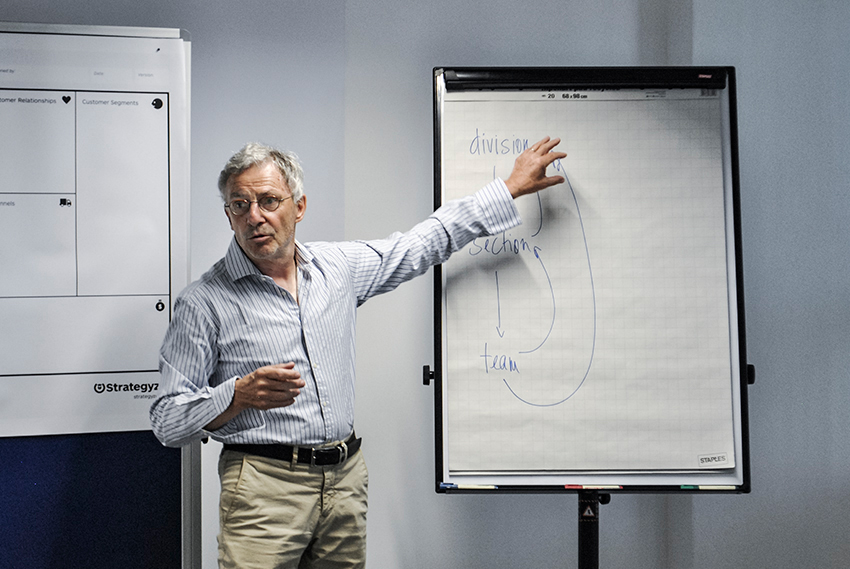Contact
Get in touch with us!
We look forward to hearing your special needs.
Contact us at +49 551 5312650 or send us a message.
We believe we can make work better. More productive in the outcomes and more satisfying in the work. We believe we must work better to thrive and survive in a future driven by digitalisation, globalisation and interconnected complexity.
How we lead, how we cooperate, and how we deal with change and drive change are keys to making work work better.

We stand for a supportive leadership, that creates the openness, responsibility and motivation where people can give their best, at the same time provides enough direction and alignment.
This involves supporting and coaching people to let their strengths shine, and where appropriate to challenge and hold them accountable. This leadership is based in self-awareness, authentic contact, and the ability to work with conflict when needed. It focusses on the team’s wellbeing, the value creation for the internal or external customer and continual development, learning and change. The default is transparency, openness and participation, while being stringent in keeping focus. It views failures as a chance and necessity to learn and learning as universal in a changing world of work.
It is ambidextrous in the sense of seeing which areas need primarily efficiency, clear process and stability, and which need more creativity, experimentation and learning. It sees how these areas change and the required leadership changes too. Leadership takes culture into account whether national culture, company institutional or team culture or generational. In the complexity within which we operate to lead is also to not-know, and still decide. And if this sounds like a lot, one more thing. To lead well means to accept the fact that we are all (still) only too human.
We stand for a supportive leadership, that creates the openness, responsibility and motivation where people can give their best, at the same time provides enough direction and alignment.
This involves supporting and coaching people to let their strengths shine, and where appropriate to challenge and hold them accountable. This leadership is based in self-awareness, authentic contact, and the ability to work with conflict when needed. It focusses on the team’s wellbeing, the value creation for the internal or external customer and continual development, learning and change. The default is transparency, openness and participation, while being stringent in keeping focus. It views failures as a chance and necessity to learn and learning as universal in a changing world of work.
It is ambidextrous in the sense of seeing which areas need primarily efficiency, clear process and stability, and which need more creativity, experimentation and learning. It sees how these areas change and the required leadership changes too. Leadership takes culture into account whether national culture, company institutional or team culture or generational. In the complexity within which we operate to lead is also to not-know, and still decide. And if this sounds like a lot, one more thing. To lead well means to accept the fact that we are all (still) only too human.

We all know we need to cooperate well. The complexity we are dealing with needs our connected intelligence, creativity and energy. And yet under stress, we often fall back into patterns of behaviour that undermine our ability to work together well.
For many tasks the team is the basic productive unit. Building and maintaining trust and clarity in a team has an immediate impact on how productive we are, and how happy or unhappy we are with our work life. The consequence is that a part of our work is to look after the trust and clarity in the teams we lead and the teams we are members of.
We, at inspeyer, stand for cooperation based in realistic trust and clarity. For deciding about what a team does best, and where we need individual responsibility. Trust, the basis for good cooperation, is slower to build than to lose. And teams are often not stable but fluid, created and left as needs and projects change. Here we need the skill of teaming, of being able to quickly create relationships and structures to work together well. To do this we need an understanding of personality differences, power relationships, team roles and team culture combined with an understanding of who we as a team are creating value for. And what they care about.
We believe in a cooperation that involves enough people, but not too many. That values good meetings and stops meetings that drain time and energy. That encourages participation and then decides and acts.
To cooperate well we cannot only look at the team. However strong a team is, sustainable success relies on good cooperation with other teams inside and outside our organisation.
We all know we need to cooperate well. The complexity we are dealing with needs our connected intelligence, creativity and energy. And yet under stress, we often fall back into patterns of behaviour that undermine our ability to work together well.
For many tasks the team is the basic productive unit. Building and maintaining trust and clarity in a team has an immediate impact on how productive we are, and how happy or unhappy we are with our work life. The consequence is that a part of our work is to look after the trust and clarity in the teams we lead and the teams we are members of.
We, at inspeyer, stand for cooperation based in realistic trust and clarity. For deciding about what a team does best, and where we need individual responsibility. Trust, the basis for good cooperation, is slower to build than to lose. And teams are often not stable but fluid, created and left as needs and projects change. Here we need the skill of teaming, of being able to quickly create relationships and structures to work together well. To do this we need an understanding of personality differences, power relationships, team roles and team culture combined with an understanding of who we as a team are creating value for. And what they care about.
We believe in a cooperation that involves enough people, but not too many. That values good meetings and stops meetings that drain time and energy. That encourages participation and then decides and acts.
To cooperate well we cannot only look at the team. However strong a team is, sustainable success relies on good cooperation with other teams inside and outside our organisation.

We often meet change weariness or change inertia. A tiredness after so many change initiatives, a waiting for it to go away so we can carry on; or the recognition that change is really needed, but there is only limited success in making it happen. Will change slow down? No. Do we humans need stability and constancy as well as excitement and learning? Yes. If constant technologies, familiar markets, unchanging organisations are not the source of stability in future, then we need others. Stability in ourselves, resilience to stress, a shared culture and values, a sense of purpose, trust in leadership can all provide stability in times of change. And when we feel psychologically secure enough, we are better able to see clearly what needs to happen and give our energy and creativity to be the change.
We often meet change weariness or change inertia. A tiredness after so many change initiatives, a waiting for it to go away so we can carry on; or the recognition that change is really needed, but there is only limited success in making it happen. Will change slow down? No. Do we humans need stability and constancy as well as excitement and learning? Yes. If constant technologies, familiar markets, unchanging organisations are not the source of stability in future, then we need others. Stability in ourselves, resilience to stress, a shared culture and values, a sense of purpose, trust in leadership can all provide stability in times of change. And when we feel psychologically secure enough, we are better able to see clearly what needs to happen and give our energy and creativity to be the change.
Get in touch with us!
We look forward to hearing your special needs.
Contact us at +49 551 5312650 or send us a message.